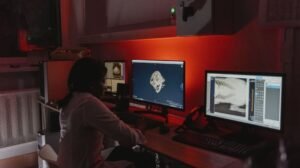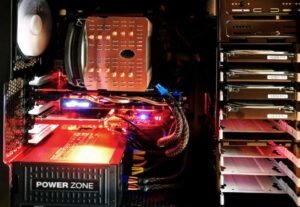How Is AI Used in Movies
Artificial Intelligence (AI) has become an integral part of the movie-making process, revolutionizing the industry in several ways. From visual effects to scriptwriting, AI technologies are being implemented to enhance creativity, streamline production, and improve audience engagement. This article explores the various applications of AI in the world of movies.
Key Takeaways:
- AI is used in movies for visual effects, character creation, and motion capture.
- Machine learning algorithms help in data analysis and prediction for box office success.
- Natural language processing assists in scriptwriting and dialogue generation.
- AI-powered recommendation systems are used to personalize the audience experience.
**Visual Effects and Character Creation:** AI plays a significant role in the creation of stunning visual effects that heighten the cinematic experience. Through machine learning algorithms, computers are trained to analyze and understand complex visual data, allowing for more realistic special effects. *For instance, AI can generate lifelike creatures or environments that would otherwise be impractical to create manually.* Moreover, AI-powered tools are used to design and animate virtual characters, providing filmmakers with greater flexibility and creative control.
**Motion Capture and Animation:** AI technologies are extensively used in motion capture, a process where actors’ movements are recorded and transferred onto digital characters. By capturing the intricate details of human performance, AI enables animators to create believable and expressive characters that resonate with the audience. *Motion capture, when combined with AI algorithms, allows for precise character movements and natural interaction in the virtual world, bringing digital creations to life.*
| Application | Description |
|---|---|
| Visual Effects | AI helps create realistic and breathtaking visual effects, improving the overall cinematic experience. |
| Scriptwriting | Natural language processing assists in generating and enhancing movie scripts and dialogues. |
| Recommendation Systems | AI-powered systems personalize the audience experience by suggesting relevant movies. |
**Data Analysis and Prediction:** AI algorithms are used to analyze vast amounts of data, such as audience preferences, historical box office records, and social media trends. By studying this data, machine learning models can make insightful predictions regarding the success of a particular movie. *These predictions help filmmakers and studios make informed decisions about marketing strategies and potential profitability.* Additionally, AI-based algorithms assist in optimizing release schedules by identifying the most advantageous time to launch a film.
- **Scriptwriting and Dialogue Generation:** Natural language processing (NLP) technologies are employed to assist in scriptwriting. AI algorithms analyze vast amounts of text to identify patterns and generate relevant dialogues. *This allows filmmakers to explore alternative approaches to storytelling and obtain fresh perspectives from AI-powered systems.* NLP systems also provide language translation and subtitling services, facilitating global distribution and accessibility.
- **Personalized Audience Experience:** Recommendation systems powered by AI are transforming how movies are recommended and consumed. By analyzing user data and preferences, AI algorithms can suggest films tailored to individual viewers. *This enhances the overall audience experience by providing personalized content recommendations based on their tastes and interests.* Movie streaming platforms often leverage these systems to keep viewers engaged and increase customer satisfaction.
| AI Prediction | Box Office Performance |
|---|---|
| High success | Blockbuster |
| Moderate success | Box office hit |
| Low success | Limited release |
The integration of AI into the movie industry continues to evolve with each technological advancement. As AI algorithms become more sophisticated, we can expect even greater enhancements to visual effects, storytelling, and audience engagement. The possibilities for AI in movies are endless, and it is an exciting time for both filmmakers and audiences alike.

Common Misconceptions
Misconception 1: AI can fully replace human actors
One common misconception is that AI has the capability to completely replace human actors in movies. While AI technology has advanced significantly, it is still unable to fully replicate the nuanced emotions, expressions, and creativity of human actors.
- AI lacks the ability to convey human emotions authentically.
- Human actors bring unique perspectives and experiences to their performances.
- AI-generated acting may lack the improvisational skills necessary for certain scenes.
Misconception 2: AI can single-handedly create movies
Another misconception is that AI has the ability to independently create movies from start to finish. While AI can aid in various aspects of film production, such as generating scripts or assisting in video editing, it still relies on human direction and creativity to bring a film to life.
- AI may struggle in understanding complex and abstract concepts necessary for storytelling.
- Humans are needed to make creative decisions regarding cinematography, sound design, and overall film direction.
- AI lacks the intuitive understanding of human culture and societal nuances required for successful storytelling.
Misconception 3: AI always portrays a dystopian future in movies
Many people believe that AI is primarily used in movies to depict a dystopian future where machines have taken over the world. While this is a common theme, AI is actually used in a wide range of movie genres and storylines, including science fiction, drama, and action, portraying a variety of perspectives on AI technology.
- AI is often depicted as an ally or a tool that aids humans in positive ways.
- Movies showcase different possibilities and ethical implications of AI technology.
- AI can be portrayed with a sense of mystery, curiosity, or even humor in non-dystopian films.
Misconception 4: AI always accurately predicts box office success
There is a misconception that AI technology, with its vast amount of data and predictive algorithms, can accurately determine the success or failure of a movie at the box office. However, while AI can provide valuable insights and predictions, factors such as audience preferences, marketing, and timing still play significant roles in the success of a film.
- AI cannot fully account for unpredictable human behavior and subjective taste.
- Audience reception is influenced by a variety of factors beyond AI predictions.
- Timing of release, competition, and marketing strategies greatly impact a movie’s success.
Misconception 5: AI-generated effects are always flawless and undetectable
Some people believe that AI-generated visual effects in movies are always flawless and indistinguishable from real-world footage. However, while AI can enhance and streamline the visual effects process, it is not immune to imperfections and limitations.
- AI-generated effects may lack a certain level of realistic details and intricacies.
- Human VFX artists are still required to oversee and fine-tune AI-generated effects.
- AI has not completely replaced the need for practical effects or physical props in movies.

The Role of AI in Movie Production
Artificial Intelligence (AI) has revolutionized various industries, including the entertainment sector. In the realm of movies, AI has brought about significant advancements, improving various aspects of production. This article explores how AI is utilized in movies and showcases ten remarkable examples.
Virtual Actors and Actresses
AI-driven technology has made it possible to create virtual actors and actresses in movies. These digitally created characters can be highly realistic, enabling filmmakers to bring fictional beings to life.
| Movie | Virtual Character | Year |
|---|---|---|
| Avengers: Endgame | Thanos | 2019 |
| Blade Runner 2049 | Rachael | 2017 |
| Rogue One: A Star Wars Story | Grand Moff Tarkin | 2016 |
Optimized Cinematic Effects
AI algorithms are utilized to enhance cinematic effects, elevating the visual experience for moviegoers. These effects are becoming increasingly indistinguishable from reality.
| Movie | Cinematic Effect | Year |
|---|---|---|
| Inception | Zero-gravity fight scene | 2010 |
| Avatar | Pandora landscapes | 2009 |
| Doctor Strange | Magical reality-bending | 2016 |
Character Creation
AI plays a pivotal role in creating characters, enabling filmmakers to generate intricate details, traits, and personalities.
| Movie | Generated Character | Year |
|---|---|---|
| Ex Machina | Ava | 2014 |
| Interstellar | TARS | 2014 |
| Her | Samantha | 2013 |
Enhanced Video Editing
AI-powered video editing tools streamline the editing process, saving valuable time and allowing filmmakers to bring their visions to life more efficiently.
| Movie | Video Editing Technique | Year |
|---|---|---|
| Birdman | Single-shot filming | 2014 |
| 1917 | Simulated single-shot filming | 2019 |
| La La Land | Color grading | 2016 |
Script Analysis and Prediction
AI algorithms are employed to analyze vast amounts of movie scripts, enabling prediction of potential and successful film production.
| Movie | Script Analysis | Year |
|---|---|---|
| Argo | Prediction of award-winning film | 2012 |
| The Revenant | Identifying potential critical acclaim | 2015 |
| The Social Network | Predicting box office success | 2010 |
Emotion Recognition in Audiences
AI algorithms can analyze facial expressions of movie audiences to gauge emotional responses. This data helps filmmakers understand how their movies are perceived and adjust their storytelling techniques.
| Movie | Emotion Analyzed | Year |
|---|---|---|
| Get Out | Audience fear and shock | 2017 |
| Inside Out | Viewer emotional engagement | 2015 |
| Black Panther | Audience empowerment | 2018 |
Optimized Marketing Campaigns
AI-driven algorithms contribute to targeted marketing campaigns by analyzing data and predicting audience preferences.
| Movie | AI-driven Marketing Strategy | Year |
|---|---|---|
| The Dark Knight | Social media engagement analysis | 2008 |
| Deadpool | Personalized viral marketing | 2016 |
| The Matrix | Real-time data-driven trailers | 1999 |
Improved Sound Effects
AI algorithms enhance sound design by creating intricate and realistic sound effects.
| Movie | AI-generated Sound Effect | Year |
|---|---|---|
| Dunkirk | Bomb explosions | 2017 |
| Gravity | Space ambiance | 2013 |
| Mad Max: Fury Road | Engine roars | 2015 |
Efficient Movie Production Planning
AI technologies assist in planning movie production, optimizing schedules, and managing resources.
| Movie | AI-assisted Planning | Year |
|---|---|---|
| The Lord of the Rings Trilogy | Optimized shooting schedule | 2001-2003 |
| Gravity | Effective use of 3D filming technology | 2013 |
| The Avengers | Coordinated action sequences | 2012 |
The utilization of AI in movies has had a profound impact on the industry, revolutionizing both the creative and technical aspects of production. From the creation of virtual characters to optimized cinematic effects, AI has sparked remarkable innovation. The ability to analyze scripts, audiences, and marketing data allows filmmakers to make more informed decisions, maximizing the potential success of their films. Furthermore, AI streamlines and enhances numerous production processes, facilitating efficient planning and resource management. As AI continues to evolve, the possibilities in movie production are endless, promising an exciting future for the film industry.
Frequently Asked Questions
How Is AI Used in Movies?
Question 1
What is AI?
AI, or Artificial Intelligence, refers to the simulation of human intelligence in machines that are programmed to think and learn like humans. It involves creating algorithms and models that can perform tasks requiring human-like intelligence.
Question 2
How is AI used in movies?
AI is used in movies in various ways, including creating realistic visual effects, character animation, and virtual actors. It is also used in post-production processes like video editing and color correction. AI can help enhance the overall cinematic experience by automating repetitive tasks and enabling the creation of lifelike and immersive scenes.
Question 3
What are some examples of AI used in movies?
Some examples of AI used in movies include the use of deep learning algorithms to generate realistic landscapes and characters, facial recognition software for special effects makeup, and machine learning algorithms for predicting audience preferences and optimizing movie trailers.
Question 4
How does AI impact the movie industry?
AI has revolutionized the movie industry by enabling filmmakers to create stunning visual effects, realistic characters, and immersive scenes. It has also optimized various production processes, making them more efficient and cost-effective. Additionally, AI has helped in audience engagement and marketing by providing data-driven insights for personalized recommendations and targeted promotions.
Question 5
Are there any drawbacks of using AI in movies?
While AI has brought significant advancements to the movie industry, there are also potential drawbacks. Over-reliance on AI may lead to a loss of creativity and originality in storytelling. Moreover, there are ethical concerns surrounding the use of AI, such as deepfakes and the potential misuse of personal data for marketing purposes.
Question 6
Can AI replace human actors in movies?
While AI can create incredibly realistic virtual actors, it is unlikely to completely replace human actors in movies. Human actors bring a level of emotion, nuance, and authenticity to performances that AI is yet to fully replicate. However, AI can assist in certain aspects of character creation and animation, enhancing the abilities of human actors.
Question 7
What are the future possibilities of AI in movies?
The future possibilities of AI in movies are vast. AI can continue to advance visual effects, creating even more realistic and immersive experiences. It can also improve the efficiency of pre-production planning and scheduling. Furthermore, AI may enable personalized movie recommendations based on individual preferences and provide filmmakers with valuable insights for enhancing storytelling.
Question 8
Is AI used in movie recommendation systems?
Yes, AI plays a significant role in movie recommendation systems. Algorithms analyze user preferences, viewing history, and other data to suggest movies that align with individual tastes. AI continually learns from user feedback, improving the accuracy of recommendations over time.
Question 9
What are the challenges of using AI in movie production?
Some challenges of using AI in movie production include the high computational requirements for complex visual effects, the need for extensive training data to produce accurate results, and the need for skilled professionals to operate and optimize AI systems. Additionally, integrating AI into existing production pipelines and workflows can be a complex process that requires careful planning and coordination.
Question 10
Can AI create entirely new movie concepts and scripts?
While AI is capable of generating certain elements like dialogue lines or plot points based on existing data, it is yet to create entirely new movie concepts and scripts from scratch. The creative aspect of storytelling and the ability to craft compelling narratives are still largely considered within the realm of human imagination and expertise.




